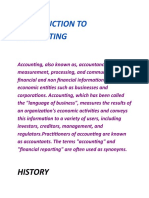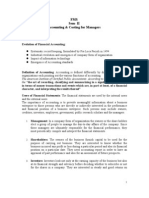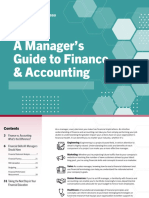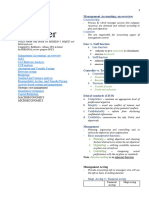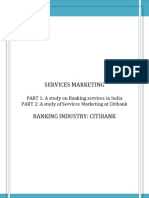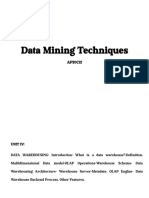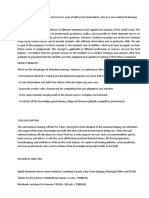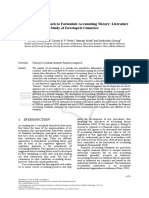Accounting and Financial Management
Introduction Financial management is gaining on strenght as time goes by. Why you might ask, what is the role of financial management, that made financial management gain on importance in past few years. I will try to explain what is the role of financial management and I will try to explain why did financial management gain on its importance in recent years. Many people confuse financial management and accounting. This is the biggest mistake one can make, since financial management has nothing to do with accounting. The main role of financial management are of course finances. Financial management manages where the finances are coming from, how much they cost, where they are going to be invested and what profit should the bring. Financial Management function in an organisation As in other management roles, so is in this one. The most important thing is the growth of company, the profit making and making the owners/shareholders happy. It is actually an art, financial management is also very connected with risk judgement, since all investments involve risk and financial management needs to find the middle way between risk and profit. Now why has financial management became so important recently? Because of the global economy and so many threats that are out there hovering over companies. Companies do not just do what they do. They cannot just make one product and sell it. Every day bigger part of companies portfolio are stocks or with other words investments. Companies try to lower the risk of their existance by investing in other fields of market. And becouse of that, even if they fail to sell their product as they used to, they still will have some income coming from dividends and capital gains in their stock investments. Financial manager in an organisation can help organisation in evaluating projects, which project is feasible and which one is not feasible and he is the whole sole expert of hedging techniques. referred from www.sayeconomy.com
Every manager needs to understand finance if they are to play an active role in helping their organization achieve its objectives. However, not every manager needs the same level of skill and understanding as specialist
�financial managers. A good knowledge of the key concepts of prudent financial management as modern financial accounting should equip all managers with the knowledge they require.
Benefits for Individuals due to Finance Managers Enables all managers to understand finance, allowing them to play a more active role in helping their organization achieve its objective Demonstrates a manager's understanding of financial management and accounting processes Understand and communicate better with finance specialists. Benefits for Organizations in Employing finance managers Every business decision made by managers across all functions has a financial impact. This qualification will help to verify that your managers are competent in their understanding of good financial practices.
Accounting Introduction Accounting is a profession as old as the hills. It was a well known practice in the Roman, Ancient Egyptians and Greek civilizations. In these times, the main function of accounting was to collect facts and figures to protect the interests of the owners. After the fall Of the Roman Empire up until the fourteenth century there was decline in the interests of accounting due to the lack of international trade. There was much conflict between countries, government, churches and the people and the arts suffered accordingly.
It was about the time of The Renaissance that the principles that form the basis of the modern accounting system were developed, double entry bookkeeping. Financial statements made an appearance in the fifteenth century and the Industrial Revolution in the nineteenth century blew old accounting practices right out of the water. Importance Organizations and the structure of business ownership are overhauled according to the needs created by the changes in society. The size of organizations grew and with it the advent and growth of collective ownership.
�The function of accounting is no longer to protect the interests of the owner of a business but to provide financial reports to shareholders of a company and external users outside of the business. With the growth of these organizations the evolution of the managerial role of accounting in the decision-making and planning processes is now necessary for the future development of companies. Modernisation in Accounting In recent times, the most significant changes to affect accounting has been due to the advancements made in computer technology. This has enabled the production of more accurate information, saving lots of time and money and has been suitably dubbed the Information Age. Accounting Function in an Organisation Today, one of the main functions of accounting would be to communicate this financial and business information to interested users within and outside of the organization. The information is presented as graphs, tables and reports expressed in terms that these users can comprehend and that is in money terms. This information will assist in decision making. The quantity of information is important but also the quality of the information that must be considered. There is a cost associated with the collection of information and a benefit to be gained from the information thus the term cost benefit analysis. Naturally it is economical when the benefits exceed the costs. Poor quality information can cloud business decisions and out of date information is of no use to anyone. The accounting system relies on accurate processing of transactions to provide financial data that is converted into reliable and relevant financial information which is used by management to make decisions. There are many groups and individuals who have an interest in the financial reports of a business. * Employees are concerned about their job security and bonuses. * Trade Unions are concerned about improving wages and improving working conditions. * The customers are concerned about the quality of the product. * The general public may be concerned about environmental issues and overseas ownership. * Creditors are concerned about whether to extend credit facilities to the business.
�* Investors are concerned about how efficiently and profitably the business is operating. * Government departments such as the Tax Office and the Bureau Of Statistics are interested in information on the business. In the business world, accounting can provide the information that enables management to plan and then control the activities of the business and then enables the different interested groups to assess the performance of a company and establish accountability to the higher authority for the activities.Therefore the worker is accountable to the management, which in turn is accountable to organizations and the owners who are accountable to the government and the general public. Referred from www.articlebase.com Non Finance Managers Finance may not be the fundamental part of everyone's role but it is increasing difficult to survive, therefore non finance managers needs to understand financial information in the company. There is a growing trend to work in multi disciplinary teams where knowledge of the core finance concepts is necessary to achieve a common level of understanding and communication in relation to shared objectives and corporate drivers. Those who need to make presentations to boards or committees will benefit from knowing some of the key financial concepts in order that they can present their ideas with a high level of financial authority. After all there are not many boards that do not have a finance director.
Reasons for why Non financial managers need to understand financial information The majority of business publishes at least an annual set of financial statements. The processes and rules and to produce the financial statements can be complex and people can easily spend a whole career developing and maintaining the skills to keep pace with on going change. Following important information is necessary to be understood by a non finance manager in order to get involved completely in the affairs if the company and in order to perform his job in the efficient manner. At a fundamental level there are 3 core financial statements. The balance sheet, the profit & loss account, and the cash flow statement.
�The balance sheet shows a breakdown of assets and liabilities at a specific point in time. The profit & loss account shows income and expenditure for a specific time period (usually one year). The cash flow statement shows a breakdown of cash inflows and outflows over a specific period (usually one year). Financial statements can be an excellent way to understand more about your competitors, key customers, business partners, or even your own company Interpreting the financial statements Interpreting financial statements can be difficult, particularly if you are comparing organisations of different sizes, different industries or different time periods. One mechanism to help understand trends is financial ration analysis. Ratios can be wide and varied. Some of the core ratios are included below. These ratios, based on simple mathematical formulae, can give a quick health check on organisations finances. So understanding all these above mentioned information is now necessary for non finance managers.
EXTERNAL USERS OF FINANCIAL STATEMENT AND WHAT INFORMATION THEY NEED Institutional investors: The external users of financial statements are basically the investors who use the financial statements to assess the financial strength of a company. This would help them to make logical investment decisions. Financial Institutions: The users of financial statements are also the different financial institutions like banks and other lending institutions who decide whether to help the company with working capital or to issue debt security to them. Government: The financial statements of different companies are also used by the government to analyze whether the tax paid by them is accurate and is in line with their financial strength. Vendors: The vendors who extend credit to a business require financial statements to assess the creditworthiness of the business. General Mass and Media The common people as well as media are also the users of financial statements.
�Here is a brief list of users of financial statements: 1. Existing equity investors and lenders, to monitor their investments and to evaluate the performance of management. 2. Prospective equity investors and lenders, to decide whether or not to invest. 3. Investment analysts, money managers, and stockbrokers, to make buy/sell/hold recommendations to their clients. 4. Rating agencies (such as Moody's, Standard & Poor's, and Dun & Bradstreet), to assign credit ratings. 5. Major customers and suppliers, to evaluate the financial strength and staying power of the company as a dependable resource for their business. 6. Labor unions, to gauge how much of a pay increase a company is able to afford in upcoming labor negotiations. 7. Boards of directors, to review the performance of management. 8. Management, to assess its own performance. 9. Corporate raiders, to seek hidden value in companies with under priced stock. 10. Competitors, to benchmark their own financial results. 11. Potential competitors, to assess how profitable it may be to enter an industry. 12. Government agencies responsible for taxing, regulating, or investigating the company. 13. Politicians, lobbyists, issue groups, consumer advocates, environmentalists, think tanks, foundations, media reporters, and others who are supporting or opposing any particular public issue the company's actions affect. 14. Actual or potential joint venture partners, franchisors or franchisees, and other business interests who need to know about the company and its financial situation. Referred from http://finance.mapsofworld.com
�LIMITATIONS OF PUBLISHED FINANCIAL STATEMENTS
However there are a lot of limitations with the current financial statements. They convey good details about the quantitative economic data but do not address any of the qualitative economic variables. Qualitative attributes such as the morale of the employee force or the quality of the management team are some of the critical factors that are relevant to the decisions and judgments that the financial statement user is making. The current accounting process has no way of measuring the value of these intangible assets. Hence, even though the entity's human resources and information resources are its most valuable assets, they are ignored in the financial statements. Similarly trademarks and brand value of a company are not recorded as assets. Brand value of a company is built over time and has a lot of economic value. Understanding the Limitations of Financial Statements Financial Statements are the key tools used to convey the economic state of an entity that help individuals make informed decisions. The important financial statements produced by an entity are the balance sheet, income statement, statement of changes in owner's equity and statement of cash flows. These statements are produced considering the concepts of consistency, full disclosure, materiality and conservatism. They provide a solid picture of an entity's performance and with comparative statements for consecutive years, the users of financial statements can easily spot changes in the entity's financial position and in the results of its operation. However there are a lot of limitations with the current financial statements. They convey good details about the quantitative economic data but do not address any of the qualitative economic variables. Qualitative attributes such as the morale of the employee force or the quality of the management team are some of the critical factors that are relevant to the decisions and judgments that the financial statement user is making. The current accounting process has no way of measuring the value of these intangible assets. Hence, even though the entity's human resources and information resources are its most valuable assets, they are ignored in the financial statements. Similarly trademarks and brand value of a company are not recorded as assets. Brand value of a company is built over time and has a lot of economic value. Assets are always valued at their original price. Even if the value of an asset has significantly increased over time, it is still reported at the original cost. The value of land has significantly risen over the past few
�decades, but entities still report it at the original cost for which they had bought it. Impact of inflation is also not considered when preparing financial statements. The impact to the usefulness of financial statements is negligible when inflation is low but it is significantly higher when inflation rate reaches 10% or more. A typical example is that the cost of goods sold reflects original cost even though the cost of replacement might be significantly higher. Another limitation of financial statements is that it does not capture important changes in the market place and industry and hence sudden deviation in the financial performance of an entity is not addressed in the right context. This can mislead a lot of individuals from making the right decisions. A key factor for understanding the financial standing of a company is by comparing it with competitors in the same industry. Comparability between firms using different accounting techniques is very difficult and with the current globalization this becomes even more complicated as accounting standards are different across the world. Referred by http://www.scribd.com
